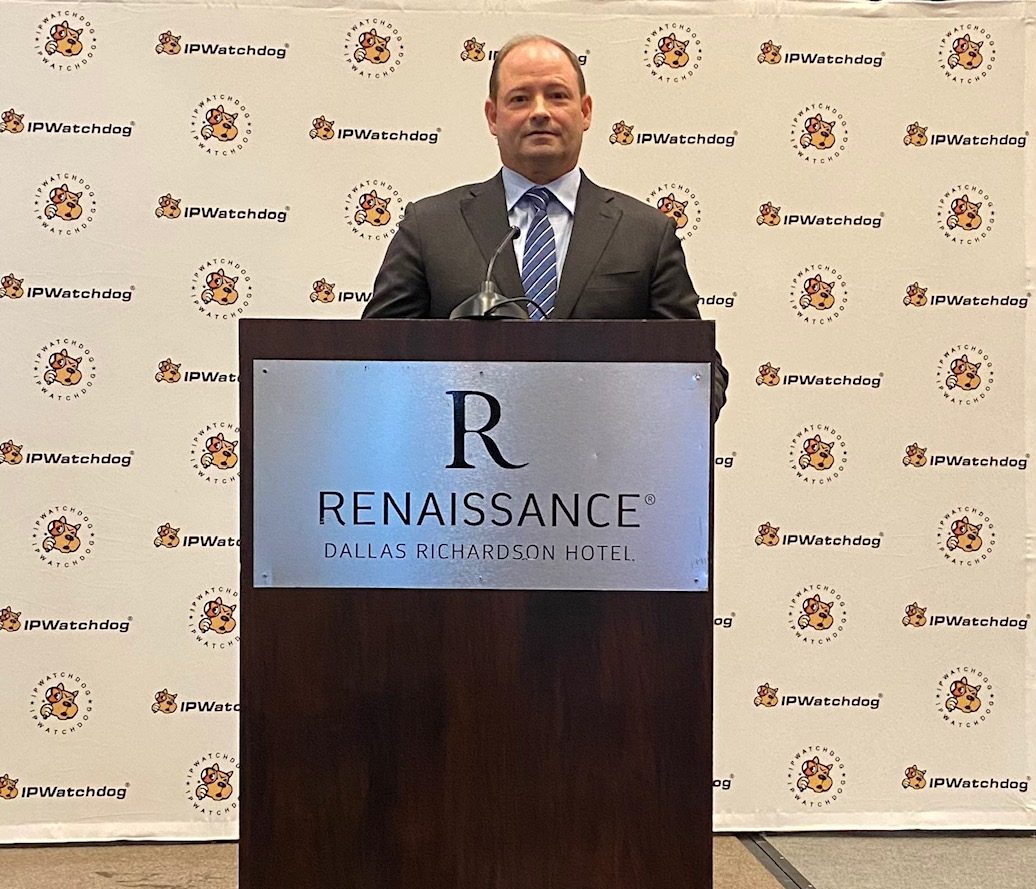“We cannot as a nation have a policy to protect IP and then systematically weaken it.”

Mark Snyder
Mark Snyder, who has served as Senior Vice President and Deputy General Counsel for Litigation at Qualcomm since 2016, during his Luncheon Keynote on Day 2 of IPWatchdog LIVE 2021 suggested that the United States needs a new innovation policy. The current innovation policy consists of the following 18 words on the U.S. State Department website: “The State Department is committed to removing barriers overseas, protecting intellectual property, and maintaining U.S. technological edge.” Snyder said he was “blown away that we did not have something more meaningful than that.” Further, only three of those words – “protecting intellectual property” – are actually concrete policy, and the United States is arguably flouting them, Snyder said.
Since the decision in eBay v. MercExchange limiting the ability of patent owners to obtain injunctions, which was followed by a series of subsequent blows to patent owners, “we’re not protecting IP,” he added. “We cannot as a nation have a policy to protect IP and then systematically weaken it.” Snyder referred to this as “innovation policy moonwalking,” in which we’re working hard to look like we’re going forward but we’re really going backwards. “Eighteen words just don’t cut it.”
Snyder joined Sheridan Ross directly out of law school, prior to a series of in-house positions, including five years as lead IP counsel for Kyocera Wireless, a company spun off from Qualcomm’s terrestrial handset division in the early 2000s. After leading Kyocera’s patent portfolio, litigation and IP licensing matters, Snyder joined Qualcomm, where he gained responsibility over the semiconductor firm’s global litigation and regulatory matters, including antitrust issues impacting Qualcomm’s licensing activities.
Snyder was an important part of Qualcomm’s victory last August at the U.S. Court of Appeals for the Ninth Circuit vacating the Northern District of California’s ruling that Qualcomm’s licensing practices surrounding the company’s standard-essential patents (SEPs) were unlawful. Judge Lucy Koh had previously held that Qualcomm’s fair, reasonable and non-discriminatory (FRAND) licensing obligations for its SEPs required the company to license its chip technologies to its competitors in the chip market. On appeal to the Ninth Circuit, Qualcomm successfully convinced the appellate panel that the chipmaker was under no antitrust duty to deal with its competitors and that no evidence existed to suggest that any changes in Qualcomm’s licensing scheme terminated a voluntary and profitable course of dealing in order to harm a competitor, but rather were spurred by changes in patent exhaustion doctrine. Coverage of the Ninth Circuit’s decision indicated that both Snyder and Qualcomm General Counsel Rosenberg were intimately involved in the appeal.
He likewise played a crucial role in the company’s global litigation against Apple, which began when Apple raised antitrust claims regarding Qualcomm’s patent licensing practices in January 2017. Litigation between Apple and Qualcomm expanded across the globe, and after Qualcomm obtained an injunction in China against a series of older iPhones infringing Qualcomm’s chip technologies, Snyder reportedly called out Apple for being “disrespectful” of Chinese courts after evidence surfaced that Apple continued to sell its infringing iPhone products after the injunction was entered. A few months later, after opening arguments began in Apple and Qualcomm’s Southern District of California trial, Qualcomm scored a major victory by entering into an agreement to settle ongoing litigation against Apple in exchange for a six-year patent license as well as a one-time payment from Apple.
Later in his keynote, Snyder explained that the Apple litigation could and should have been resolved through arbitration, but “that never gained traction because of the constraints Apple wanted to put on the arbitration process.” As a result, said Snyder, the companies ended up with 100+ cases around the world instead of one arbitration.
Snyder said the Apple example was a “necessary ugly” that is representative of the larger trend of “efficient infringement”, a term used to describe well-financed infringers who are willing to take the risk of infringing because they can afford to challenge innovators in multiple forums. Snyder lamented the practice and remarked, “If you’re taking away the incentive of innovators, eventually you’re going to see a loss of innovation.”

![[IPWatchdog Logo]](https://ipwatchdog.com/wp-content/themes/IPWatchdog%20-%202023/assets/images/temp/logo-small@2x.png)

![[Advertisement]](https://ipwatchdog.com/wp-content/uploads/2024/03/IP-Copilot-Apr-16-2024-sidebar-700x500-scaled-1.jpeg)
![[Advertisement]](https://ipwatchdog.com/wp-content/uploads/2024/04/Patent-Litigation-Masters-2024-sidebar-early-bird-ends-Apr-21-last-chance-700x500-1.jpg)

![[Advertisement]](https://ipwatchdog.com/wp-content/uploads/2021/12/WEBINAR-336-x-280-px.png)
![[Advertisement]](https://ipwatchdog.com/wp-content/uploads/2021/12/2021-Patent-Practice-on-Demand-recorded-Feb-2021-336-x-280.jpg)
![[Advertisement]](https://ipwatchdog.com/wp-content/uploads/2021/12/Ad-4-The-Invent-Patent-System™.png)







Join the Discussion
2 comments so far.
George
September 15, 2021 11:58 pmSmall entity inventors will soon become extinct! There simply is no incentive to become an inventor or even entrepreneur (dependent on high quality IP), anymore. It just doesn’t pay (not even minimum wage)!
America should never have approved of the AIA either. Instead it should have required the rest of the world to adopt America’s original and very successful approach to protecting IP, if they wanted a harmonized and universal system. America basically invented the concept of IP and thought it important enough to include it in the very first Article of the Constitution. So, what the hell happened to it? It helped to create the entire 19th and 20th centuries!
A once great (though not perfect) system has now just become a legal Titanic. It can’t possibly survive in its present form. There has to be a much better way of doing all of this! One that doesn’t require YEARS of time and millions of dollars in order to resolve problems, but only weeks or months instead. For Pete’s sake, it’s the 21st century, not the 1700’s!
Model 101
September 15, 2021 06:42 pmMark… thanks